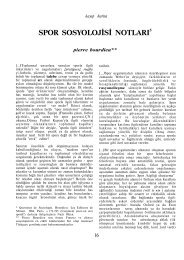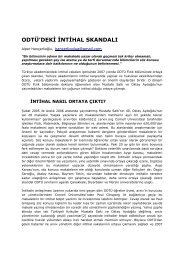Untitled
Untitled
Untitled
Create successful ePaper yourself
Turn your PDF publications into a flip-book with our unique Google optimized e-Paper software.
INTRODUCTION 7<br />
celebrated film Berlin, die ,�)mphonie einer Orossstadt (1927), whose use of<br />
montage he subjected to scathing criticism; perhaps the idea for the<br />
study came to him in the course of his analysis of the German film<br />
production of 1928, in which he first differentiated by social stratum<br />
his concept of the mass-cultural audience.1O In retrospect, it almost<br />
seems as if he did not need a particular impulse at all. For the study of<br />
salaried employees combines themes and interests that Kracauer had<br />
been pursuing since the beginning of the 1920s. The theoretical<br />
perspectives, hermeneutic attentiveness and literary techniques that<br />
distinguish his text, however, were acquired only in a remarkable<br />
process of intellectual self-modernization.!!<br />
The programme of this modernization is contained in nuce in an essay<br />
that first appeared in 1922 in the Frankfurter Zeitung, under the title of<br />
'Die Wartenden' ('Those Who Wait'). Already in this essay Kracauer is<br />
concerned with one specific social stratum's attitude towards life; and<br />
already here he formulates his findings in spatial metaphors of 'emptiness'<br />
and 'the void' The space indicated by these metaphors is, however,<br />
not an ideological but a metaphysical one. And the stratum is not the<br />
declassed one of salaried employees, but the educated stratum to which<br />
Kracauer himself belonged, the elite of 'scholars, businessmen, doctors,<br />
lawyers, students and intellectuals of all sorts', who 'spend most of their<br />
days in the loneliness of the large cities' .!2 Finally, what forms these many<br />
individuals into a group is no sociological, but an existential condition.<br />
It is, as Kracauer explains, the 'metaphysical suffering from the lack of a<br />
higher meaning in the world' - from their 'exile from the religious<br />
sphere' - 'which makes these people companions in misfortune' !3<br />
In the guise of a group-sociological diagnosis, Kracauer here<br />
expresses the sense of existence that marks the starting point of his own<br />
intellectual and literary development. In his early texts there is little<br />
trace of modernist enthusiasm, let alone of any revolutionary stance.<br />
Kracauer sees himself not at the beginning of a new age, but at the end<br />
of a historical process of 'decay' in which, with the 'disappearance of a<br />
meaning embracing reality as a whole',14 the once saturated totality of<br />
being is broken up into isolated subjects and a chaotic multiplicity of<br />
things. Only in the perspective of a catastrophic fragmentation and desubstantialization,<br />
a breakdown of 'community bound by form'15 and a<br />
loss of metaphysical security, is he able to perceive the modern<br />
'thoroughly rationalized, civilized society' 16<br />
Kracauer obtains the explanatory models and figures of thought<br />
which guide this perception by combining topoi of the contemporary<br />
conservative critique of culture with theoretical paradigms of the<br />
philosophical and sociological avant-garde. Thus his concept of a<br />
'thoroughly rationalized, civilized society' is indebted, on the one hand,






